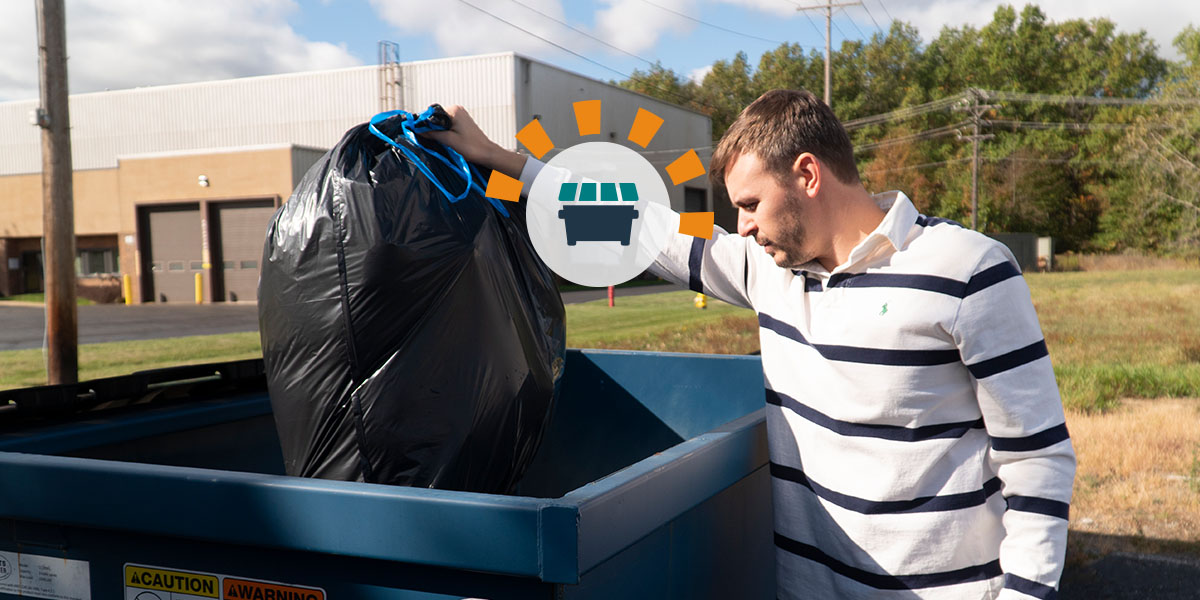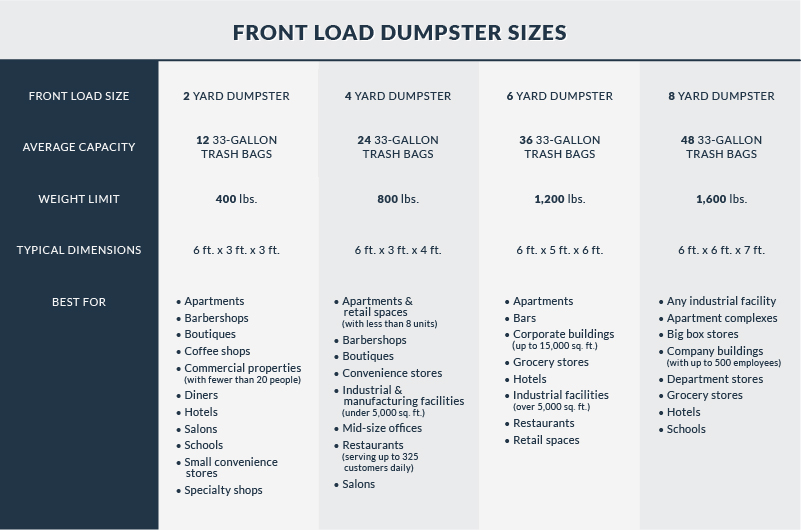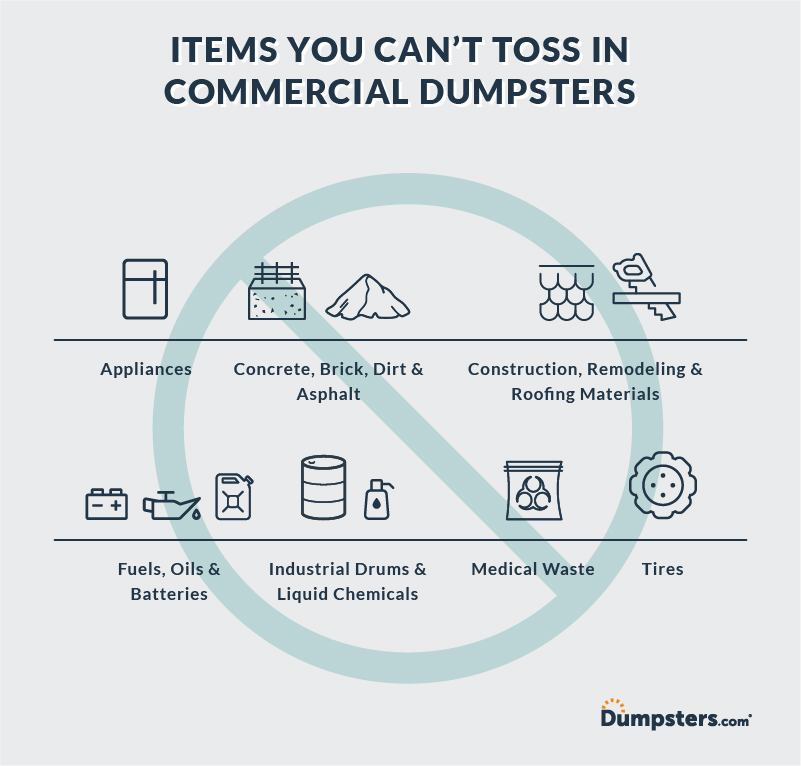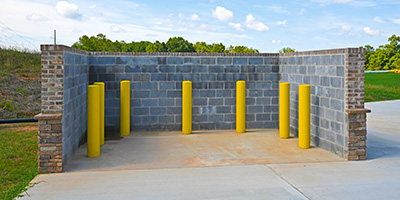18 Tips for Smarter Commercial Trash Collection
Simple ways to keep your property presentable and pay less for waste removal.
Make cleanup a breeze with a front load dumpster:

Cut Costs – and Get More Efficient Service – With Our Waste Removal Tips
Whether you’re looking for a provider to pick up trash for your new business or want to reduce how much you’re currently spending for commercial waste collection, there are easy ways to streamline the trash removal process.
Follow these tips to get better service rates, keep the headaches away and avoid unexpected dumpster fees on your monthly invoice.

Tips for Setting Up Commercial Waste Service at a New Location
Need a bin or two for your new business? Check out these tips to make sure you’re successful from the start.
1. Order Your Dumpster on Time
For many new business owners, a dumpster is the last thing on their minds as they get ready to open. That’s why many people wait until the last minute to set up their trash pickup service.
But if you don’t rent your dumpster in time, you might risk failing your inspection. Most dumpster companies can’t deliver a bin and start service with such short notice – especially if it’s a day before or the day of the inspection.
To prevent this from happening, it’s best to get a container delivered one week before you open your business – at the latest. You’ll also want to give yourself a few days (or even weeks) beforehand to research haulers and find the best waste solution for your organization.
2. Know Your Local Waste Regulations
If you’re not following local waste regulations, you risk being fined by the city. With commercial trash removal, there are a few key regulations to look out for. Get in touch with your local municipality to ask about:
Many states and cities in the U.S. have mandatory recycling requirements for commercial businesses. For example, the state of California requires that commercial businesses that produce four cubic yards or more of garbage per week implement recycling programs. Ask your municipality if you need to recycle certain types of waste such as cardboard, plastic or metal cans.
3. Choose the Right Dumpster Size for Your Business
The four most common commercial dumpster sizes are:
The size names indicate the volume of waste (in cubic yards) they can hold.
Generally, you’ll want to select a size based on how much waste your organization produces. Here’s a quick chart breaking down the average capacity, typical dimensions and industries that are best for each dumpster size:


Pro Tip
Keep in mind how much space you have available on-site to safely place a bin. Your business may generate enough waste to fill an 8 yard container, but if you only have a limited amount of space, you may have to rent a smaller size.
Thankfully, if this is your first time choosing a dumpster size for a business location, you don’t have to go at it blindly. We’ll help you choose the dumpster size that fits the amount of waste your business typically produces within your pickup timeframe.
That way, you won’t be stuck paying for extra pickups or for more volume than you really need.
4. Identify Where to Place Your Dumpster
At this point, you’ve selected a dumpster size. But where will your container go when it gets delivered?
In most cases, waste providers will go out to the property to make sure it’s serviceable and to determine the location before accepting the customer. Your waste provider should help you choose the best possible spot, but you’ll need to take measurements outside of the building to find an area with enough space and no obstructions like branches or hanging wires.
Find more guidelines for choosing where to place your bin in our guide about how much space you need for a permanent dumpster.
5. Shop Around for the Best Provider
We suggest reaching out to at least two or three different commercial waste removal service companies to compare prices and service features so you can make sure you’re getting the most cost-effective trash pickup solution for your organization.
Here are a few good rules of thumb to follow during this process.
Compare Dumpster Prices
Get quotes from different dumpster companies and ask what’s included. You’ll find that commercial bin collection costs vary from provider to provider and depend on a few key factors including the size, pickup schedule and contract length.
Make sure to ask if these costs are included in their quotes:
- Taxes
- Trip fees
- Delivery fees
- Disposal fees
- Administration fees (environmental)
If you’re not quoted an all-inclusive price, some of the fees listed above could be tacked on later. If the hauler says these expenses aren’t included in their quotes, ask them to estimate the average cost of each so you’ll have a more realistic idea of how much their dumpster service will actually cost.
We also suggest that you get quotes for different pickup frequencies. The more often your trash gets picked up, the more you’ll get charged. If you need to change your pickup frequency in the future, you’ll have a better idea of how much it may increase your bill.
Ask About the Flexibility of Service
Business needs change over time. And as the pandemic, labor shortages and recent economic downturns have shown us, things can change very rapidly and without warning. The last thing you want to be stuck in a contract with a waste provider who won’t work with you if you need to modify your service.
Your goal, then, is to find a garbage removal company that offers flexible service so you can adjust your dumpster size, pickup frequency or pickup days as needed.
So, when you’re talking to different waste companies, ask if you can alter your service after the contract has been signed or if you have to wait until the contract ends or renews to change it. See if any fees are involved in service changes. And definitely ask about the costs involved in ending a contract early.
See if You’ll Have Dedicated Account Management
Sometime throughout your waste contract, you’ll most likely need to ask a question. But how hard will it be to reach a person directly? Will you have to waste time on hold waiting to get transferred to yet another person (or worse: a robot) for something so simple as asking about a line on your invoice or finding out why your garbage wasn’t picked up?
That’s why it’s wise to look for a waste provider that offers a direct line – especially if you manage, or plan to open, more locations in the future. Having one point of contact who’s familiar with your organization and is easy to get in touch with can save you hours of valuable time.

“Because we know how many hats most employees and business owners have to wear, we provide one dedicated account manager for every business customer we work with. You’ll have one go-to contact to keep your business rolling. Every business has direct access to their account manager by phone, text or email to make your service as seamless as possible. The best part? You don’t have to pay extra for an account manager – it’s a free part of your service.”
Look for a National Provider
If you run a business in more than one city or state — or plan to open new businesses in the future — it may be best to find a provider who can serve you nationwide so you won’t have to shop around every time you set up a new location.
Read Reviews
The best way to get an idea of what your service will be like? Read honest feedback from other businesses that use their trash collection service. As part of your research, check out reviews and ratings of your local dumpster companies in Google searches and on websites like:
There’s also the traditional word-of-mouth method. Talk to other local businesses in your area and ask them about their experiences. This can help you get a more well-rounded perspective on the quality of the service you can expect.
Consider Long-Term Contracts to Save Money
Opening a new business is always a gamble, but if you want to save money up front, you may be able to cut costs by signing a three-year service contract instead of a one-year contract.
Depending on the trash collection company, three-year contracts can be $15-$30 less expensive per month than their one-year counterparts. Of course, this comes with a risk of being stuck in a contract with one provider, so balance this risk with the cost savings you could achieve when making your decision and see if they outweigh any early termination fees you may have to pay to end your contract early.
Don’t Sign Until You Read the Contract
Before you commit to working with a dumpster provider, go over your contract with a fine-toothed comb. As you’re reading through the fine print, watch out for things like automatic renewals and hidden fees.
Automatic Renewals
Many contracts from ongoing service providers like commercial waste collection companies include automatic renewal clauses to ensure smooth service and encourage you to continue working with them. After all, if your contract auto-renews, you won’t have to go through the hassle of signing and negotiating with them again.
This can be a problem if you want to switch providers. Let’s say, for example, that you’re in a three-year contract with a dumpster company that ends on March 31st. You want to switch to a new provider starting on April 1st.
You call to end your contract with your current provider on March 15th, only to learn that you had to give your provider at least 90 days’ written notice before April 1st, so your contract has automatically renewed, and you’re stuck with them.
Don’t be alarmed if you see automatic renewal language in your contract. This is a very common practice nowadays, but just take note of when the contract ends, when it automatically renews and how many days’ notice you have to give to end your service contract.
Hidden Fees
Earlier on in the process, you’ve likely already asked about what’s included in your rate. However, some waste companies will slip additional fees into their contracts after the fact.
Common fees mentioned in contracts are administration fees or environmental charges. The problem with these kinds of fees is that they can fluctuate over time and get pretty expensive, especially since the price of gas can impact environmental costs. That’s why getting a flat rate that truly includes every fee is important – those costs will be set, so you can budget more accurately for waste removal.
6. Set Up Your Pickup Schedule
Work with your new waste provider to identify the number of pickups you need and optimal days for these pickups per week. This will depend on a few things including how much waste – and what type of waste – you produce in a set amount of time, as well as your business schedule.
7. Explore Commercial Waste Recycling Options
Even if you aren’t required to recycle by your state or municipality, this is a great time to arrange for recycling services. The trash collection company you hire should be able to service both your garbage and recycling pickup.
Recycling materials such as plastic, paper, glass, etc. can offer numerous benefits including:
- Money savings: When you recycle waste, you divert materials from your trash. You’ll need fewer pickups and may be able to use a smaller bin, so you’ll reduce your waste removal costs.
- Reducing your business’s carbon footprint: Recycling keeps more trash out of landfills, which means fewer greenhouse gases entering our atmosphere.
- Boosting your local economy: Recycling can help improve your local economy by creating new jobs. According to IBISWorld, this industry is growing, recycling facilities employ more workers now than they did in 2017, and the average recycling facility employs 16.4 employees.
Lynn Rubinstein, the executive director of the Northeast Recycling Council (NERC), points out some other benefits you can achieve by recycling.

“By putting a recycling program in place and diverting certain types of waste from landfills, you can boost employee morale, improve your image with your customers and clients, and support broader sustainability goals and climate change initiatives.”

Helpful Tips if You’re Switching Providers for Your Business Trash Removal
Looking to change who you use for your business garbage collection? Here are two tips to remember.
8. Request a Free Waste Audit
Some dumpster companies offer free waste quotes (also known as waste assessments) where they look at your current service setup and identify ways to help you save money and recycle more materials.
They will evaluate details like:
- The bin size(s) you use.
- The percentage of waste you recycle vs. send to the landfill.
- Your pickup schedule and collection frequency.
If you can get a free audit, it’s a great way to see how another provider can better serve you outside of just a quoted price or an apples-to-apples comparison of service features.
9. Look for a Smooth Transition From One Provider to Another
When switching providers, make sure there won’t be a time you’ll be without a dumpster. Ensure they can deliver a new bin to you shortly after your former provider picks up their container. Also, ask when and how you’ll be billed and if you can start your new agreement with them right after your contract with your current provider ends.

Tips to Protect Your Bin (and Keep Your Property Clean)
10. Add Accessories
Besides renting a dumpster, you can add features to your container for optimal service.

Casters
Wheels make it easier to move your dumpster in tight areas like alleyways.

Lock Bars
Prevent outside trash (and raccoons) from ending up in your bin by locking it.

Drain Plugs
Keep wet waste from leaking out of the dumpster and causing health issues.
11. Build a Dumpster Enclosure
Whether or not your municipality requires a bin enclosure, there are several benefits to having a corral. You’ll stop trash from blowing around your property, keep animals from getting inside it and have more control over who can use your dumpster.
Follow our guide for building a commercial dumpster enclosure to learn how to put up one on your property.
12. Take Other Steps to Prevent Illegal Dumping
Besides adding a lock bar to your bin and building a dumpster corral, there are other things you can do to stop people from illegally dumping garbage in your dumpster. Two examples include putting up a warning sign telling people that your bin is for private use only and installing security cameras to monitor the area.
For more tips, head to our article about preventing illegal dumping.

Tips to Avoid Unexpected Dumpster Charges
We recommend taking the time to look at your commercial dumpster invoice each month to watch out for preventable fees. To keep your rate the same each month, here are some recommendations to help avoid extra charges.
13. Understand the Different Types of Fees
You first need to know what kinds of dumpster rental fees you may face. These are common ones many businesses find themselves having to pay:
- Disposal fees
- Trip charges
- Overage charges
- Overloading fees
14. Ensure Your Dumpster Is Accessible on Pickup Day
In order for your hauler to access and dispose of your waste, the area in front of your dumpster must be clear of any obstructions. Make sure that no one parks there and keep the area plowed in the winter so you won’t have to pay trip charges.
If you keep your dumpster inside a locked corral, be careful not to lock your hauler out of the area on pickup day, or you may miss your pickup.
15. Don’t Overfill Your Dumpster
Instruct your employees on how to properly load the bin. Some containers may have signage on them with these kinds of instructions, but it may be helpful to put up posters outside or near the exit doors as reminders. Some dumpster providers may provide signs free of charge.
Don’t allow items to stick up over the top or hang over the sides of your dumpster. In addition, keep all your materials contained to ensure you don’t miss out on a pickup. Moreover, make sure employees only use your dumpster to dispose of your typical commercial trash.
Visit our dumpster fees guide to learn more ways to avoid these fees.

Pro Tip
If you’re planning a one-time project that will produce a lot of waste like a renovation or a special event, consider renting a temporary dumpster to handle this excess debris.
16. Don’t Toss Prohibited Items
Landfills don’t accept certain items because they contain hazardous materials, and if these items are found in your dumpster, you’ll need to pay extra. While disposal regulations vary, here are some items usually prohibited from commercial dumpsters:


Tips to Get the Most Out of Your Business Trash Removal Service
17. Ask for Waste Reports From Your Provider
Ask your dumpster provider to monitor your trash on a monthly, quarterly or biannual basis to identify opportunities to lower your waste disposal costs and confirm if your pickup schedule and frequency match your current waste output.

“We review our customers’ waste stream every quarter and come up with annual goals to optimize their service. We’ll help you streamline efficiencies, align your pickup frequency with business needs, adjust our service to meet your needs and more. For example, one of our larger customers had a few overage charges last year. We met with them recently and came up with a plan to help them keep this from happening again, or at least less frequently.”
18. Adjust Your Bin Size and Pickup Frequency as Needed
While it’s easy to just set up a contract and forget about your trash, there are basic things you can do to save money. You also may need to make adjustments based on the growth of your business.
Don’t miss out on these opportunities. Request free waste audits or waste reports from your trash collection company to make sure the service you’re getting is best for your business.

“Last year, a long-term customer contacted us and wanted rates for a 6 yard dumpster with locks and four pickups per week. This would have cost them $4,800 per month per pickup.
We didn’t want this customer to pay for service they didn’t need, so we recommended that they use two containers instead. This helped cut their costs by almost 48% in one location, saving them $2,300 every month.”
Go Green With Your Business
Now that you know how to have a smarter commercial trash collection, you can look into other ways to trim your costs and make your business more sustainable. Check out these posts for more tips and tricks:
What Do You Think?
Have thoughts on commercial waste collection? We're listening. Head over to Twitter or Facebook
and use #dumpstersblog to join the conversation.




